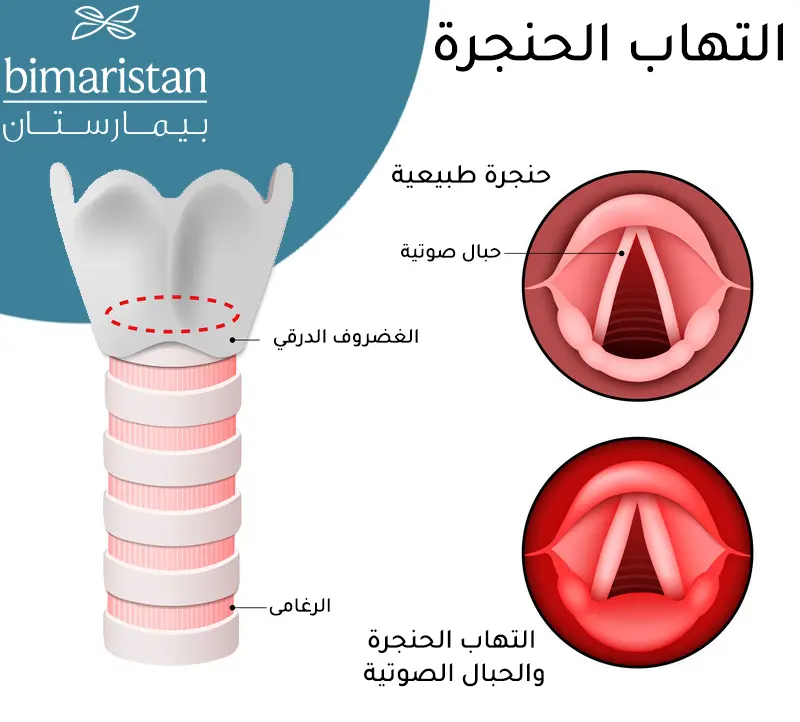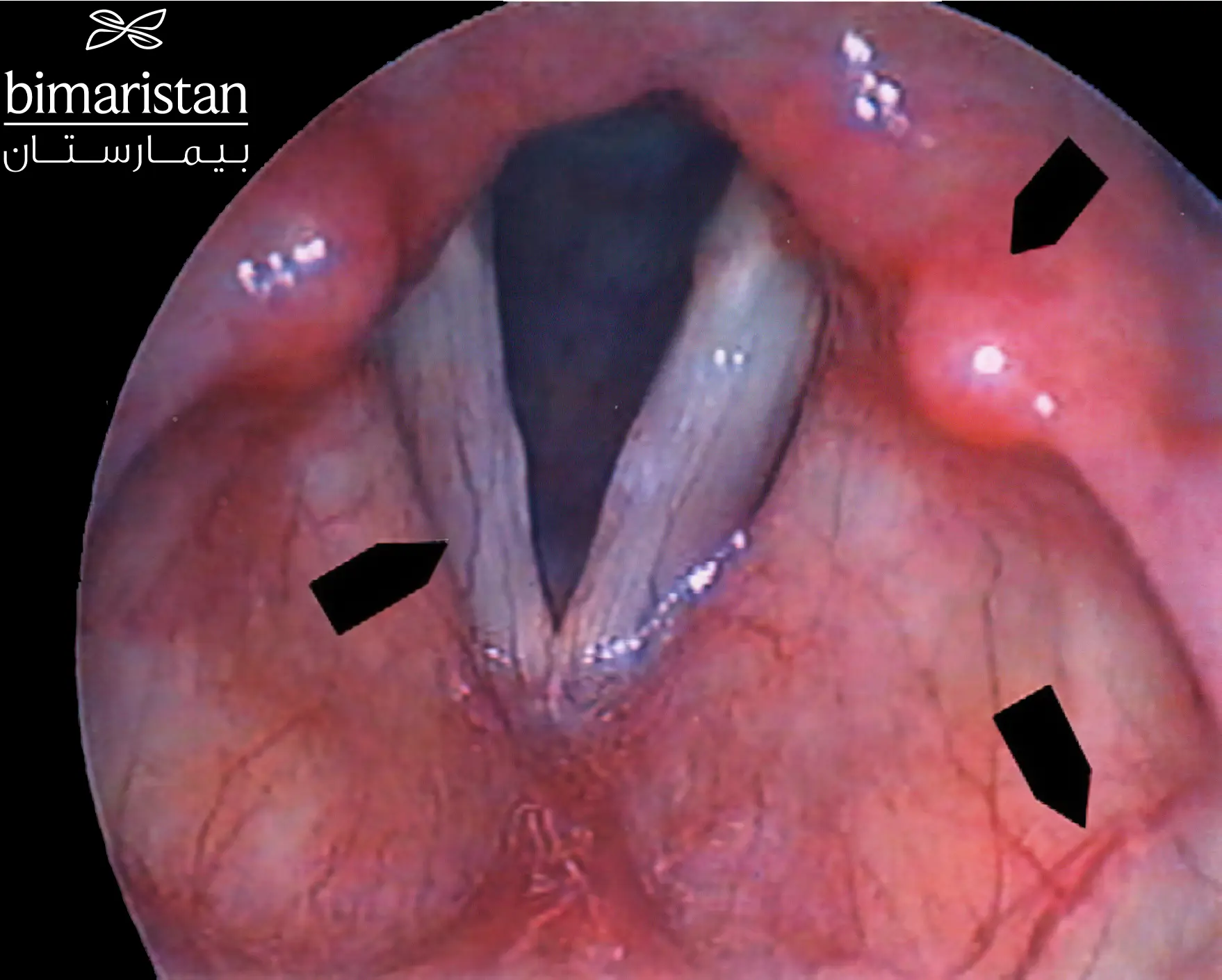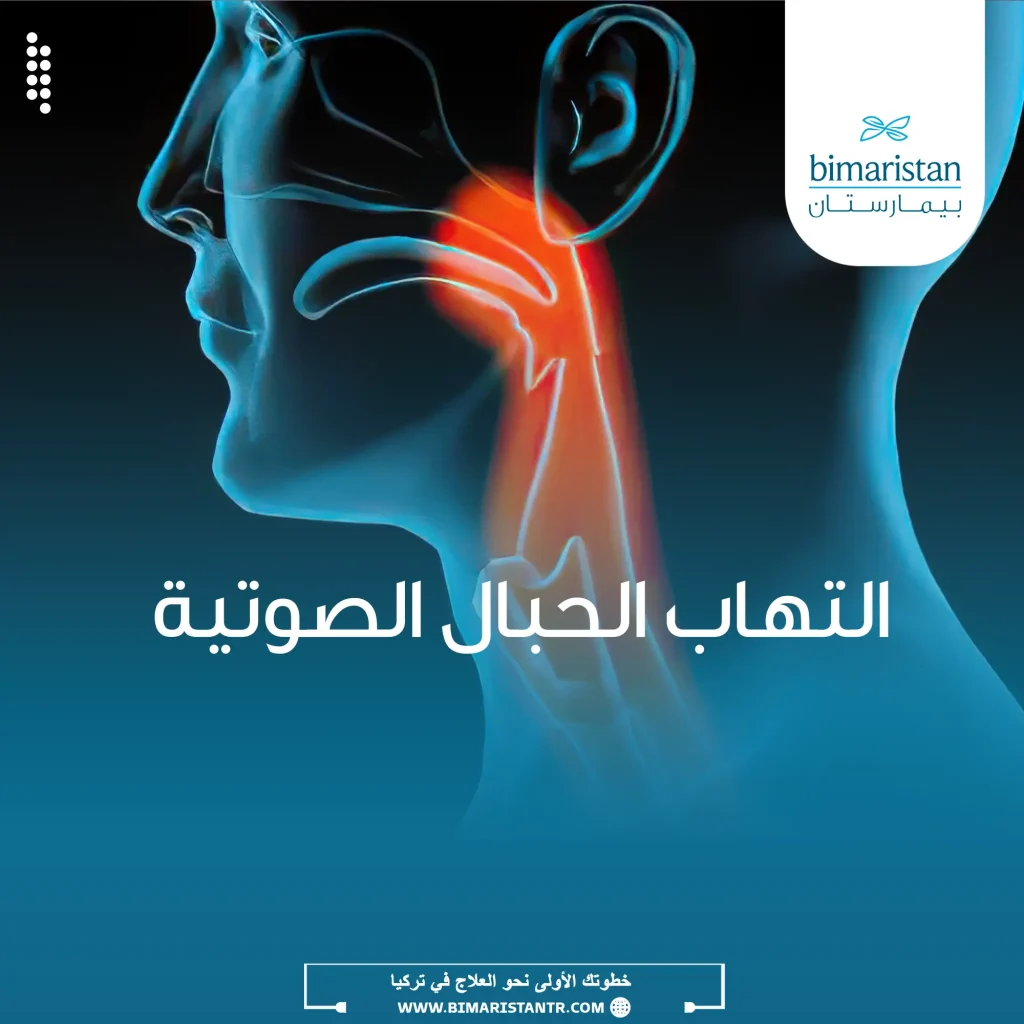التهاب الحبال الصوتية حالة شائعة تعرف علمياً باسم التهاب الحنجرة ومن أهم أعراضها بحة الصوت بسبب التهابات تصيب الأحبال الصوتية، تترافق غالبًا مع التهاب الحلق.
يتطور مرض التهاب الحبال الصوتية خلال فترة قصيرة لدى الشخص مسبباً أعراضاً حادة مثل السعال وبحة في الصوت (صوت أجش) بالإضافة لحالة عامة تشبه الكريب (الأنفلونزا).
تتعدد مسببات التهاب الحبال الصوتية (التهاب الحنجرة) ولكل مسبب علاج خاص به، ويغلب العلاج المحافظ في المنزل على الحالة مع ضرورة الالتزام بالتعليمات الطبية لتفادي خطر إزمان المرض وحدوث مضاعفات. تابع معنا في هذا المقال لتتعرف على المزيد عن التهاب الحبال الصوتية.
ما هو التهاب الحبال الصوتية؟
هو تهيج لمخاطية الحنجرة وتورمها بسبب وجود مخرشات لها (مواد كيميائية أو عدوى جرثومية أو فيروسية)، يؤدي هذا التورم إلى تضخم الحبال الصوتية وزيادة حجمها مع اضطرابات في حركتها (في بعض الأحيان قد يحدث شلل الحبال الصوتية) مما يسبب بحة في الصوت وصعوبة في الكلام. تؤدي المخرشات أيضاً لحدوث السعال لدى المريض.

يحدث هذا المرض غالباً بشكل مفاجئ وسريع ويتطور حتى يبلغ ذروته خلال ثلاثة أيام، قد يستمر بعدها أسبوع أو أسبوعين وغالباً ما يعقب ذلك الشفاء العفوي. ولكن ذلك لا يعني ترك الحالة بدون علاج بسبب خطورة إزمان المرض واستمراره فترة أطول مع تسببه باختلاطات.
أسباب التهاب الحبال الصوتية
تتعدد أسباب التهاب الأحبال الصوتية وبالتالي يختلف العِلاج حسب السبب، وتصنف الأسباب إلى ما يلي:
التهاب الحنجرة الإنتاني
يعد من أكثر أسباب التهاب الحنجرة شيوعاً ويقسم بحسب العامل المسبب إلى فيروسي، جرثومي وفطري. تعد الفيروسات هي المسبب الأشيع لِالتهاب الحبال الصوتية وخاصة فيروس البارا انفلونزا والذي يعطي أعراض تشبه نزلة البرد مع سُعال وبحة في الصوت.
تعتبر المسببات الجرثومية أقل شيوعاً لكنها قد تصادف عند بعض المرضى وخاصة جرثومة الدفتيريا الخناقية وقد تَكون خطيرة في بعض الأحيان عند الإصابة بالعدوى.
العدوى الفطرية للحنجرة نادرة وتشاهد عند مضعفي المناعة عادة مثل مرضى الإيدز أو الذين يعالجون بالعلاج الكيماوي وأشيعها الإصابة بفطور بالمبيضات البيض.
التهاب الحنجرة الميكانيكي
هو حدوث التهاب الحبال الصوتية بسبب الصراخ أو الغناء لفترات طويلة أو بطبقات صوت عالية، يؤدي ذلك لاهتزاز أحبال الصوت بتواتر عالي مما يؤدي لتخرب مخاطية الحبال الصوتية وجرحها، يُتبع ذلك بالتهاب الحبال الصوتية.
قد يحدث أيضاً التهاب الحبال الصوتية الميكانيكي بسبب السعال المزمن وخاصة إذا كان السعال شديداً وقوياً مما يؤَدي لجرح الحبال الصوتية بشكل متكرر.
يحدث التهاب الحبال الصوتية الميكانيكي أيضاً بسبب المحاولة المستمرة لتنظيف الحلق وإخراج المفرزات من الطرق الهوائية، تسبب هذه المحاولات جرح الحنجرة وتخريش الأحبال الصوتية.
قد يُؤدي الرض الخارجي على الرقبة في منطقة الحنجرة إلى تخريش فيها وَالتهاب الأحبال الصوتية أحياناً.
التهاب الحنجرة الكيميائي
يحدث بشكل أساسي عند مرضى الارتجاع المعدي المريئي مسبباً أذية الحبال الصوتية بحمض المعدة مما يتسبب بالتهاب مزمن في الحنجرة في غالب الأَحيان.
يحدث الالتهاب الكيميائي للحبال الصوتية أيضاً عند ابتلاع مواد كيماوية حارقة خطأً أو بقصد الانتحار مما يُسبب أذية الحلق والحنجرة والبلعوم والمريء ويحدث التهابات شديدة فيها.
يتسبب استنشاق الأبخرة المخرشة للحنجرة والمؤذية لها بحدوث التهاب كيميائي للحبال الصوتية.
التهاب الحنجرة التحسسي
يعاني بعض الأشخاص من الحساسية تجاه بعض المواد مثل الغبار مما يؤَدي لحصول رد فعل تحسسي لديهم في أحبال الصوت في الحنجرة مما يُؤدي إلى التهاب الحبال الصوتية التحسسي. قد يكون الفعل التحسسي شديداً في بعض الأَحيان ليشمل القصبات الهوائية مما يُحدث حساسية الحنجرة والقصبة الهوائية.
أسباب أخرى لالتِهاب الحنجرة
يعد التدخين من أهم مسببات التهاب الاحبال الصوتية إضافة لتسببه بضرر دائم على مستوى مخاطية حنجرة المدخن، أيضاً يعد استهلاك الكحول بشكل مفرط من مسببات التهاب الحبال الصوتية أيضاً.
أعراض التهاب الحبال الصوتية
تشتمل أعراض التهاب الحنجرة (صندوق إصدار الصوت) على تظاهرات عامة تشمل كامل الجسم وتظاهرات خاصة ترتبط مباشرة بالتهاب حبال الصوت.
الأعراض العامة لالتهاب الحبال الصوتية
وتختلف حسب المسبب، في حال كانت إصابة المريض بفيروسات الانفلونزا فسوف تظهر أَعراض الكريب والإصابة بعدوى السبيل التنفسي العلوي وهي:
- الصداع
- حرارة
- التعب العام
- السيلان الأنفي
- الألم العضلي
- ألم المفاصل
- التهاب اللوزتين الحنكيتين
- وجع عند البلع
وتكون الأعراض أشد في حال كانت الجراثيم هي السبب. في حال كان السبب تحسسي سوف تظهر أَعراض الحساسية على المريض وهي:
- حكة
- احمرار الجلد والعين
- زيادة إفراز الدمع
- سيلان الأَنف
- صعوبة التنفس
أعراض التهاب الحنجرة والحبال الصوتية الحاد
وهي الأعراض الناجمة عن تضخم الأحبال الصوتية وتضرر مخاطية الحنجرة بشكل مباشر وبالتالي تأثر عضلات التصويت وحدوث الأعراض التالية:
- تغير صوت المريض (بحة الصوت)
- صعوبة الكَلام
- التهاب الحلق
- الشعور بألم الحلق
- سعال مستمر جاف (بسبب فرط التهيج في الحنجرة)
- خروج مفرزات مع السعال أحياناً (قشع أخضر، أصفر أو عديم اللون)
تبدأ هذه الأعراض بشكل مفاجئ وتزداد شدتها خلال اليومين التاليين، عادة ما يبدأ تحسن المريض واختفاء الأعراض بعد أسبوع على بدء التهاب الحبال الصوتية. تترافق أحياناً مع التهاب الجيوب الأنفية.
قد تستمر بحة الصوت لأسبوع بعد اختفاء الأعراض، في حالات نادرة قد يتأثر التنفس لدى المريض بسبب انتفاخ الأحبال الصوتية واغلاق مجرى الهواء. هذه الحالة تصادف بشكل قليل عند البالغين وتكون أشيع عند الأطفال (التهاب الحبال الصوتية عند الأطفال) وقد تصبح مهددة للحياة.
تشخيص التهاب الحنجرة
يتم تَشخيص التهاب الحبل الصوتي من قبل طبيب الأذن أنف حنجرة (ENT) حيث يضع التشخيص بالاعتماد على القصة السريرية للمريض وعلى أعراضه، ثم يؤكد تشخيصه ببعض الاستقصاءات التصويرية مثل:
تنظير الحنجرة
ويتم التنظير باستخدام المنظار الصلب أو المرن والذي يكون على شكل سلك رفيع مثبت برأسه كاميرا صغيرة يتم إدخاله عبر الأنف أو الفم ليعبر الحلق، حيث تظهر الحنجرة والأحبال الصوتية بشكل واضح ويظهر أي التهاب أو تورم أو سوء حركة في الأحبال.

يعد هذا الإجراء مهماً عند مرضى التهاب الأحبال الصوتية المزمن (المدخنين ومرضى الارتجاع المريئي المعدي) بسبب خطورة تطور سرطان الحنجرة لديهم، حيث يظهر أي نمو غير طبيعي في مخاطية الحنجرة أو الأحبال يوحي بوجود ورم أو سرطان.
علاج التهاب الحنجرة والحبال الصوتية
كما أسلفنا يشفى التهاب الحنجرة والحبال الصوتية عادة بشكل تلقائي مع مرور الوقت في معظم الحالات دون الحاجة إلى علاج، سوف يقتصر علاج المرحلة الأولى من المرض على نصائح لتحسين الأعراض العامة وتسريع عملية الشفاء.
ينطبق هذا على التهاب الأحبال الصوتية الناتج عن العدوَى الفيروسية والتي تكون غالباً هي المسبب كونها الأشيع، في باقي الحَالات التداخل العلاجي ضروري لتحقيق الشفاء.
علاج التهاب الحبال الصوتية في المنزل
وهي نصائح لعلاج التهابات الأحبال الصوتية تساعد على تخفيف أَعراض المرض وتسريع عملية الشفاء وهي (طريقة العلاج لالتهاب الحنجرة في المنزل):
- البقاء هادئاً وصامتاً ما أمكن لإراحة الأحبال الصوتية
- ترطيب الحلق والسبيل الهوائي عبر استنشاق بخار الماء (وهو يغلي) أو باستخدام بخاخ المنثول
- مص أقراص السعلة
- الغرغرة بماء الملح الدافئ (للبالغين فقط)
- ينصح بشرب الكثير من السوائل
- تجنب التحدث بصوت عال أو الهمس (كلاهما يرهق حبال الصوت)
- تجنب التدخين أو الجلوس في غرفة فيها مدخنين
- تجنب الجلوس في غرفة يعمل فيها مكيف الهواء (يجعل الهواء جافاً مما يضر بالحبال الصوتية ويسبب جفاف الحلق)
- تجنب الإفراط في شرب القهوة أو الكحوليات لأنها ستؤدي للتجفاف
علاج التهاب الحبال الصوتية بالأعشاب
توجد عدة نباتات ذات سمعة حسنة في معالجة التهابات الحلق والبلعوم والحَنجرة ولكن قد يتداخل أخذها مع بعض الأدوية لذا يفضل استشارة الطبيب حين استخدامها لتفادي التداخلات الدوائية المحتملة. من أهم هذه الأعشاب المستخدمة في علاج التهاب الحنجرة (علاج الصوت المبحوح):
- العرق سوس
- الختمية أو الخبيزة
- الدردار الأحمر مع الليمون
- الشاي بالعسل
- خل التفاح
- الزنجبيل
- الثوم

علاج التهاب الحبال الصوتية الدوائي
قد تقوم بعض الأدوية بخفيف حدة الأعراض وتسريع عملية الشفاء وتسكين الألم ومن أهم هذه الأدوية:
- مسكنات الألم: مثل الباراسيتامول والإيبوبروفين.
- الأدوية المهدئة للسعال
- أدوية الغرغرة لعلاج التهاب الحلق
علاج مسببات التهاب الأحبال الصوتية
بعلاج السبب الكامن وراء التهاب الحنجرة يشفى الالتهاب وإلا فيصبح التهاب الأحبال الصوتية مزمناً، ولكل مسبب علاج خاص به وهي كالتالي:
- علاج التهاب أحبال الصوت الجرثومي: نستخدم هنا الصادات الحيوية حسب نوع الجرثوم المسبب لتحقيق الشفاء
- علاج الارتجاع المعدي المريئي: يصف الطبيب لعلاج هذه الحالة الأدوية المضادة لحموضة المعدة، وقد نحتاج الجراحة في بعض الأحيان، أنقر هنا لتعرف المزيد عن علاج الارتجاع المريئي.
- علاج الالتهابات التحسسية: توصف الأدوية المضادة للهيستامين مع الابتعاد هن المادة المسببة للتحسس، بعض الحالات قد تكون إسعافية تتوجب الذهاب للمشفى فوراً (صدمة تحسسية).
المعالجة الصوتية في تركيا
وهي طريقة علاج تقوم على مبدأ تعليم المريض كيفية ضبط طبقة صوته وإراحة حباله الصوتية عبر تمارين صوتية معينة من أجل تقليل الإجهاد عليها وذلك لعلاج التهابات الأحبال الصوتية الميكانيكية الناتجة عن الصراخ لمدة طويلة (علاج بحة الصوت بسبب الصراخ).
مضاعفات التهاب الحبال الصوتية
في بعض الحالات قد لا يحدث الشفاء العفوي وتتطور حالة المريض لتصبح أسوأ فتحدث بعض العقابيل التي توجب اتوجه إلى الطبيب أو المستشفى فوراً (خاصة في التهاب الحبال الصوتية عند الأطفال) وهي:
- صعوبة البلع أو التنفس
- سيلان اللعاب بشكل زائد
- ارتفاع الحرارة فوق 38 درجة
- اللهاث واختناق المريض بسبب تضيق مجرى الهواء
التهاب الحبال الصوتية حالة شائعة وغالب حالتها سليمة، يوجد منها نوعان: حاد (يدوم أسبوع) ومزمن (يدوم أَكثر من شهر)، في الحالة المزمنة يستوجب التقصي عن الأسباب وعلاجها بأسرع وقت ممكن للتخلص من الأعراض وتفادي خطر تطور المضاعفات. في الحالة الحادة يجب اتباع النصائح المذكورة كي يشفى التهاب الحبال الصوتية بسرعة.
المصادر:
